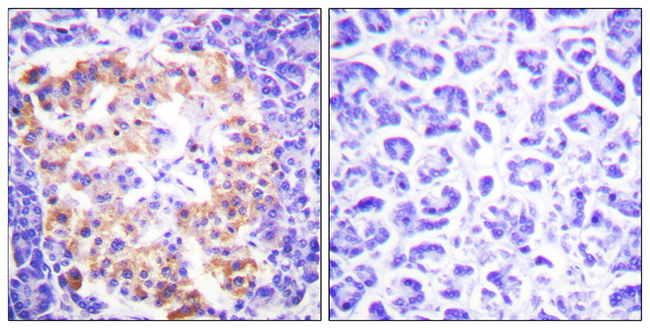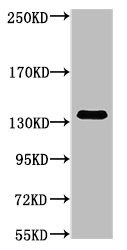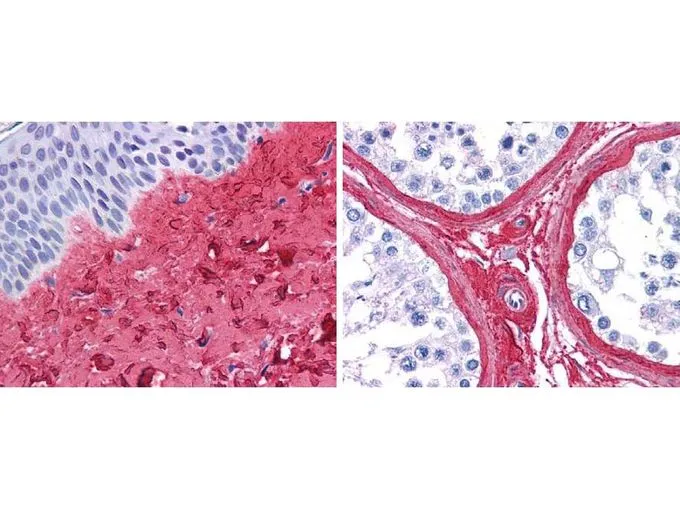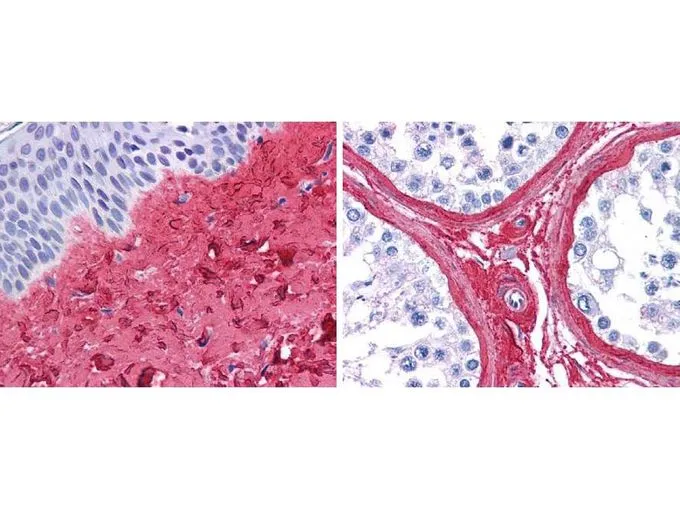![IHC-Fr analysis of rat skin tissue using GTX26310 Collagen III antibody [FH-7A] at 1:8,000. IHC-Fr analysis of rat skin tissue using GTX26310 Collagen III antibody [FH-7A] at 1:8,000.](https://www.genetex.com/upload/website/prouct_img/normal/GTX26310/GTX26310_20170605_IHC-Fr_w_23060722_325.webp)
IHC-Fr analysis of rat skin tissue using GTX26310 Collagen III antibody [FH-7A] at 1:8,000.
Collagen III antibody [FH-7A]
GTX26310
ApplicationsDot Blot, Western Blot, ELISA, ImmunoHistoChemistry, ImmunoHistoChemistry Frozen, ImmunoHistoChemistry Paraffin
Product group Antibodies
ReactivityHuman, Rabbit, Rat
TargetCOL3A1
Overview
- SupplierGeneTex
- Product NameCollagen III antibody [FH-7A]
- Delivery Days Customer9
- Application Supplier NoteIHC-Fr: 1:4,000. *Optimal dilutions/concentrations should be determined by the researcher.Not tested in other applications.
- ApplicationsDot Blot, Western Blot, ELISA, ImmunoHistoChemistry, ImmunoHistoChemistry Frozen, ImmunoHistoChemistry Paraffin
- CertificationResearch Use Only
- ClonalityMonoclonal
- Clone IDFH-7A
- ConjugateUnconjugated
- Gene ID1281
- Target nameCOL3A1
- Target descriptioncollagen type III alpha 1 chain
- Target synonymsEDS4A, EDSVASC, PMGEDSV, collagen alpha-1(III) chain, Ehlers-Danlos syndrome type IV, autosomal dominant, alpha-1 type III collagen, alpha1 (III) collagen, collagen, fetal, collagen, type III, alpha 1
- HostMouse
- IsotypeIgG1
- Protein IDP02461
- Protein NameCollagen alpha-1(III) chain
- Scientific DescriptionCollagen III is a fibrillar collagen that is found in extensible connective tissues such as skin, lung, and the vascular system, frequently in association with type I Collagen. Mutations in the gene are associated with Ehlers Danlos syndrome type IV, and with aortic and arterial aneurysms. Although alternate transcripts have been detected for this gene, they are the result of mutations; these mutations alter splicing, often leading to the exclusion of multiple exons.
- ReactivityHuman, Rabbit, Rat
- Storage Instruction-20°C or -80°C,2°C to 8°C
- UNSPSC41116161
References
- Fabrication of bFGF/polydopamine-loaded PEEK implants for improving soft tissue integration by upregulating Wnt/beta-catenin signaling.Read this paper
- Recombinant DTbeta4-inspired porous 3D vascular graft enhanced antithrombogenicity and recruited circulating CD93(+)/CD34(+) cells for endothelialization.Read this paper
- Tissue-Material Integration and Biostimulation Study of Collagen Acellular Matrices. Quintero Sierra LA et al., 2022 Jun, Tissue Eng Regen MedRead this paper
- The effect of prior long-term recellularization with keratocytes of decellularized porcine corneas implanted in a rabbit anterior lamellar keratoplasty model. Fernandez-Perez J et al., 2021, PLoS OneRead this paper
- Amianthoid transformation of costal cartilage matrix in children with pectus excavatum and pectus carinatum. Kurkov A et al., 2021, PLoS OneRead this paper
- Artificial dermal substitutes for tissue regeneration: comparison of the clinical outcomes and histological findings of two templates. De Francesco F et al., 2020 Aug, J Int Med ResRead this paper
- Inhibition of CD44 induces apoptosis, inflammation, and matrix metalloproteinase expression in tendinopathy. Wu PT et al., 2019 Dec 27, J Biol ChemRead this paper
- Developing Raman spectroscopy as a diagnostic tool for label-free antigen detection. Lewis AT et al., 2018 Feb, J BiophotonicsRead this paper
- Structure-function relations in an elastase-induced mouse model of emphysema. Hamakawa H et al., 2011 Sep, Am J Respir Cell Mol BiolRead this paper

![IHC-P analysis of rat skin using GTX26310 Collagen III antibody [FH-7A] at 1:4000. IHC-P analysis of rat skin using GTX26310 Collagen III antibody [FH-7A] at 1:4000.](https://www.genetex.com/upload/website/prouct_img/normal/GTX26310/GTX26310_20170605_IHC-P_w_23060722_602.webp)







